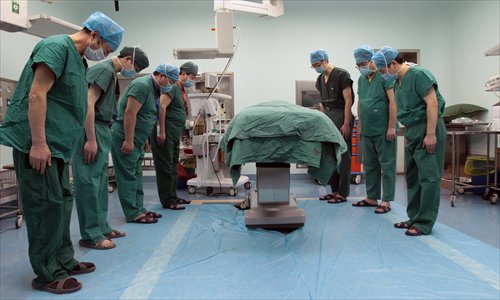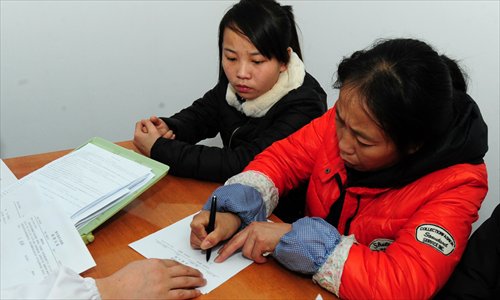HOME >> CHINA
Online organs
By Fang Yang Source:Global Times Published: 2014-3-24 19:58:01

Doctors and nurses bow to an organ donor to show their respect in Kunming, Yunnan Province, in July 2013.

A wife signs a form to donate her husband's body in Zhoushan, Zhejiang Province. Photos: CFP
Wang Hong registered on savelife.org.cn on Thursday, one day after the nation's official organ donation registration website was launched.
"I had been considering being an organ donor for a long time, but I didn't know how to act on it," Wang, a 32-year-old mother, told the Global Times.
It took only a few minutes to complete the registration, which requires the donor's name, ID number and phone number.
After registration Wang received an electronic certificate and she put it online via her social networking account, which soon triggered a lot of responses from friends and colleagues.
"They asked questions about why I did this and how it would affect my life," Wang said, adding that many had no idea what organ donation is and "thought I would have to give my organs while I was still alive."
"I don't think there are enough volunteers, and if there could be more publicity, hopefully more people could participate," Wang said.
Wang believes that this website is a good platform for the public to learn more about organ donation and get involved.
The website is jointly operated by health authorities and Rotary International District 3450 (RID 3450), an organization in Hong Kong which has been promoting organ donation for years.
Volunteers' information will only be accessible to authorized organizations and coordinators, the National Health and Family Planning Commission (NHFPC) said, adding that donors can modify or withdraw their registration via the website and donations will have to be approved by close relatives after the donors' death.
Zhou Jun, an official with the NHFPC, said the website had been set up to share stories of organ donation and promote public awareness.
Lack of awareness
China introduced an organ donation system in 2010, with the Red Cross Society of China (RCSC) serving as an independent third party to supervise and facilitate donation procedures.
With the world's second-largest demand for organ transplants, about 300,000 patients suffer from organ failures each year in China, but only around 10,000 organ transplants are performed due to a lack of donors, according to the NHFPC.
"The lack of organ donors is one of the biggest obstacles in China's organ donation and transplant work," He Xiaoshun, vice president of the No. 1 Hospital Affiliated with Sun Yat-sen University, told the Global Times.
Traditional Chinese customs call for people to be buried or cremated with their organs intact, which is believed to be a cultural barrier to convincing people to become donors.
"My friends told me that I will be buried with an incomplete corpse," Wang said. "But why does one need an intact body after death?"
However, there are hopes that young people are now more open-minded towards organ donations due to a decline in traditional beliefs. The increased usage of online social networks is also being heralded as a potential tool for spreading awareness of organ donation.
People used to register as donors by submitting a written application to the RCSC, a RCSC staff member told the Global Times, adding that they also launched their own separate online registration website in March.
Since 2010, over 19,000 people have registered as organ donors, and 1,596 successful donations have taken place, according to the RCSC.
He Xiaoshun said that with just 19,000 people out of the 1.3 billion people in China registered as donors, the system has been a failure. He, also a member of China's organ donation committee, pointed out that about 48 percent of US citizens have registered to donate their organs after death.
The RCSC staff member said that their registration website is still in a trial mode and will officially be launched in April. "We hope that online registration will make the application process easier for the public."
The team behind savelife.org.cn are also planning publicity campaigns. "We will enrich the website with supporting messages and videos from various sectors, in particular celebrities, international experts and people who are well trusted by the public," a representative from RID 3450 told the Global Times via e-mail on Sunday.
Public engagement will be built up through publicity campaigns such as prizes for the most moving slogans or stories about organ donation or transplantation, the organization added.
"I hope there can be more similar programs launched by all kinds of organizations to encourage organ donation in each province," He said, adding that those platforms could be integrated in the future.
Exploring new sources
Even though it started late, China has been making progresses on developing its organ donation system in recent years.
Before the introduction of the organ donation system in 2010, transplanted organs in China mostly came from executed prisoners, Zhu Jiye, director of the liver and gall bladder surgical department at the Peking University People's Hospital, was quoted as saying by the China Economic Weekly in September 2013.
In 2012, China vowed to abolish the practice of taking transplanted human organs from executed prisoners within three to five years, with the help from the organ donation trial project, which encourages more citizens to become organ donors.
At the just-concluded two sessions, former vice health minister Huang Jiefu said that organ transplant centers in 38 hospitals have stopped using organs from executed prisoners through illegal channels.
The NHFPC issued a new rule to prevent human intervention and ensure fairness and transparency in human organ distribution in August 2013, stipulating that donor organs must be distributed through a national system.
The move has been widely praised by the international community as a foundation to gain the public's trust regarding organ donation.
"It took decades to establish a sophisticated national organ donation system in Western countries," Wang Haibo, director of the China Organ Transplant Response System, was quoted as saying by an earlier bulletin of the World Health Organization.
Wang believes that China can catch up in a relatively short period of time given the combination of government support and international experience.
Experts have been discussing legislation on the organ donation process, how to improve social welfare and assistance for organ donors, and establishing the national donation system to better facilitate the process.
"We need to further amend the regulations and introduce legal confirmation on organ donation and transplant to better protect people's rights," He said.
He also suggested that China should provide social benefits and privileges to organ donors and their families, a mechanism similar to the policies encouraging blood donation by promising free blood transfusions for the donors and their family members.
On March 7, China merged the Organ Transplant Committee and the China Organ Donation Committee into a special committee to supervise organ donations and transplants.
Posted in: Society